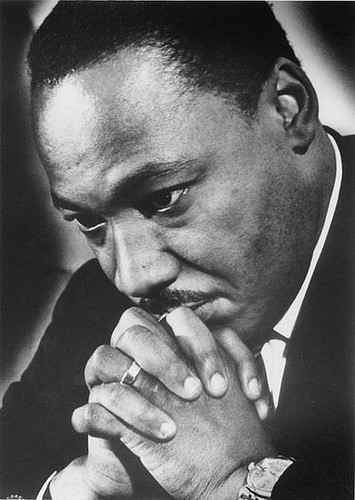Category: Pondering Peace
Lessons in Following Jesus from Martin Luther King, Jr.: “Love Your Enemies” (Part 2)
Dr. Martin Luther King, Jr. also helps us understand what Jesus meant when he told us to love our enemies. Almost inevitably, efforts towards justice will be resisted by those who are at risk of losing their greater privileges, and sometimes this resistance will be vigorous and even venomous. We see this in reading the narrative of Jesus’ life, and we see it again in reviewing the life of Martin Luther King. How is one to respond to such hatred and abuse? Jesus’ words are echoed by King, “Love your enemies.” This is at the heart of what it means to follow Jesus, and it was a key for King as well.
King, like Jesus, did not consider love to be sentimental affection or even liking the other person. Rather he taught that agape love was “understanding and creative, redemptive goodwill for all men (and women)” (52), a love that loves the other because God does. He considered love to be “the most durable power in the world” (56).
Early in his life he had considered this injunction to love one’s enemies as only applicable to personal conflicts with other individuals. It was only after he studied in depth Mahatma Gandhi’s philosophy and his campaigns of nonviolent resistance that he came to see the power of Jesus’ words for any situation of injustice or conflict. He came to see that “the Christian doctrine of love, operating through the Gandhian method of nonviolence, is one of the most potent weapons available to an oppressed people in their struggle for freedom” (150).
King analyzed the root of hate to be fear and considered the only cure of this fear-hate to be love. He saw racial segregation as based on irrational fears that could only be cast out by love. King wrote, “Only through our adherence to love and nonviolence will the fear in the white community by mitigated” (121). He realized that a guilt-ridden white minority feared that if African Americans attained power, they would take revenge for the brutality and injustices experienced over the years. King was convinced that the black community had to show them that they had nothing to fear, that they would forgive them, that they were seeking justice, not only for themselves but for white people as well. He wrote, “A mass movement exercising love and nonviolence and demonstrating power under discipline should convince the white community that were such a movement to attain strength, its power would be used creatively and not vengefully” (121).
He analyzed the international situation similarly. “Our deteriorating international situation is shot through with the lethal darts of fear…Is not fear one of the major causes of war?..first fear, then hate, then war, and finally deeper hatred”(120). Whereas in his early years he believed that war could possibly serve a negative good in preventing the spread of an evil, later he wrote, “I now believe that the potential destructiveness of modern weapons totally rules out the possibility of war ever again achieving a negative good” (151). His solution was love working through nonviolence to promote understanding and organized goodwill, and thereby build trust that leads to disarmament and reconciliation.
In a sermon entitled “Loving your enemies,” written while he was sitting in jail in Georgia, King details why we should love our enemies. His first reason is contained in these frequently quoted words: “Returning hate for hate multiplies hate, adding deeper darkness to a night already devoid of stars. Darkness cannot drive out darkness; only light can do that. Hate cannot drive out hate; only love can do that. Hate multiplies hate, violence multiplies violence, and toughness multiplies toughness in a descending spiral of destruction…The chain reaction of evil – hate betting hate, wars producing more wars – must be broken, or we shall be plunged into the dark abyss of annihilation.”(53)
In addition, we should love our enemies because to hate not only “brings irreparable damage to its victims,” it also is “injurious to the person who hates. Like an unchecked cancer, hate corrodes the personality” (53). Furthermore, he taught that “love is the only force capable of transforming an enemy into a friend. We never get rid of an enemy by meeting hate with hate; we get rid of an enemy by getting rid of enmity… Love transforms with redemptive power” (54). He believed that the means must be consistent with the ends desired, that violence cannot bring lasting peace.

In a nation engaged in endless wars and terrorized by the fear of terrorism itself, Christ’s words to love our enemies still stand. In a nation armed with more guns than people and polarized by political difference, Christ’s words to love our enemies still stand. We are to love our enemies, Scripture says, in order to show that we are children of a God who is merciful and kind to all.
This takes deep internal work of casting out the violence within us to allow ourselves to be filled with the love of God. It involves developing the capacity to forgive. “It is impossible even to begin the act of loving one’s enemies,” King said, “without the prior acceptance of the necessity, over and over again, of forgiving those who inflict evil and injury upon us” (50). It involves recognizing the goodness that exists in every person, even the seemingly most evil, and acknowledging the evil that resides even within the best of us. It requires a deep trust and relationship with God that sustains such efforts and believes that God works through them.
Such was the experience of King, as expressed in his words, “God has been profoundly real to me in recent years. In the midst of outer dangers I have felt an inner calm… When the chains of fear and the manacles of frustration have all but stymied my efforts, I have felt the power of God transforming the fatigue of despair into the buoyancy of hope. I am convinced that the universe is under the control of a loving purpose, and that in the struggle for righteousness [humanity] has cosmic companionship” (153).

*Quotes taken from Strength to Love, by Martin Luther King, Jr., Philadelphia: Fortress Press, 1981.
*Photo of friends by Naassom Azevedo on Unsplash
By Ruth Rosell, Director of the Buttry Center for Peace and Nonviolence
Posted January 24, 2020
